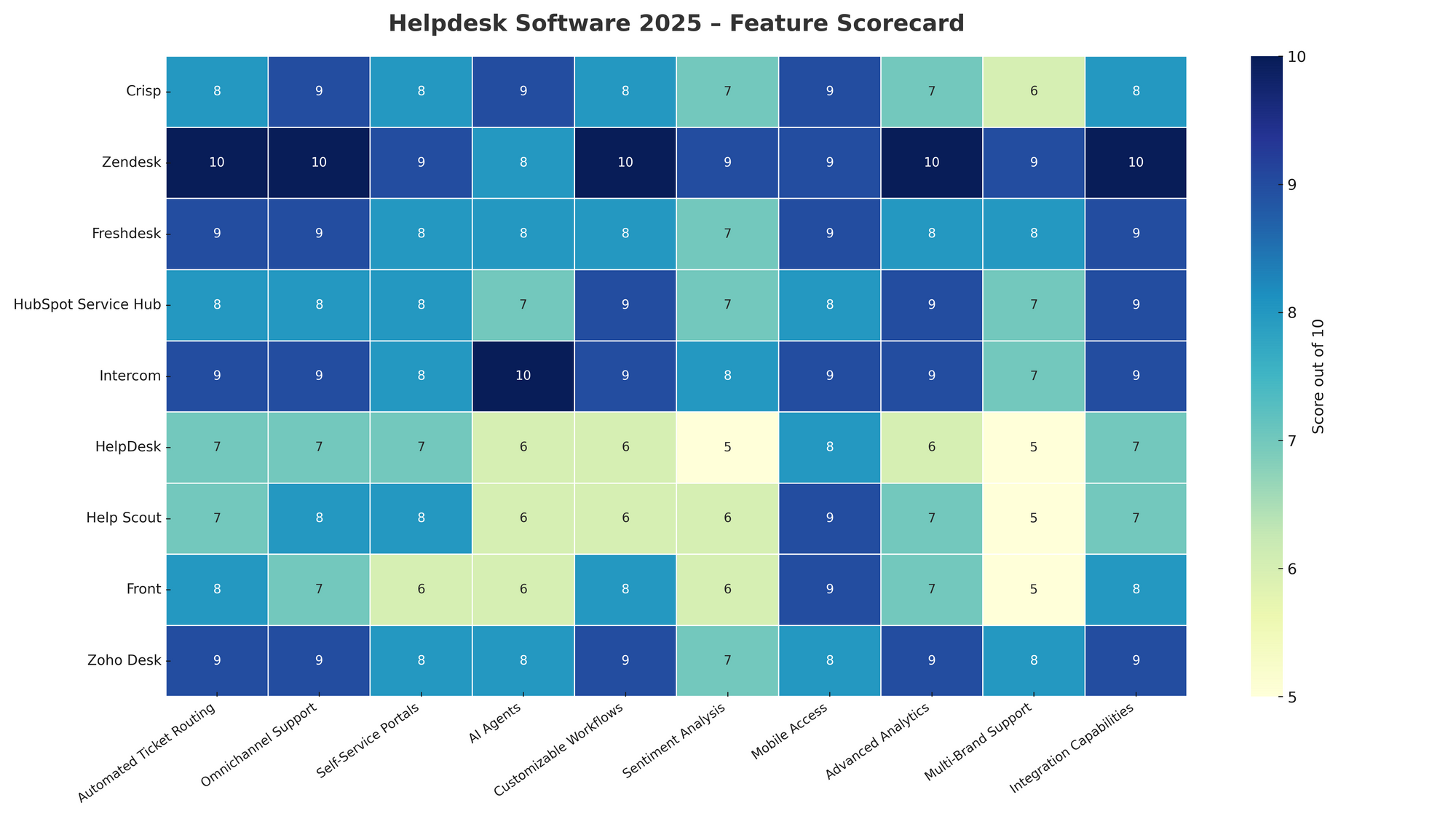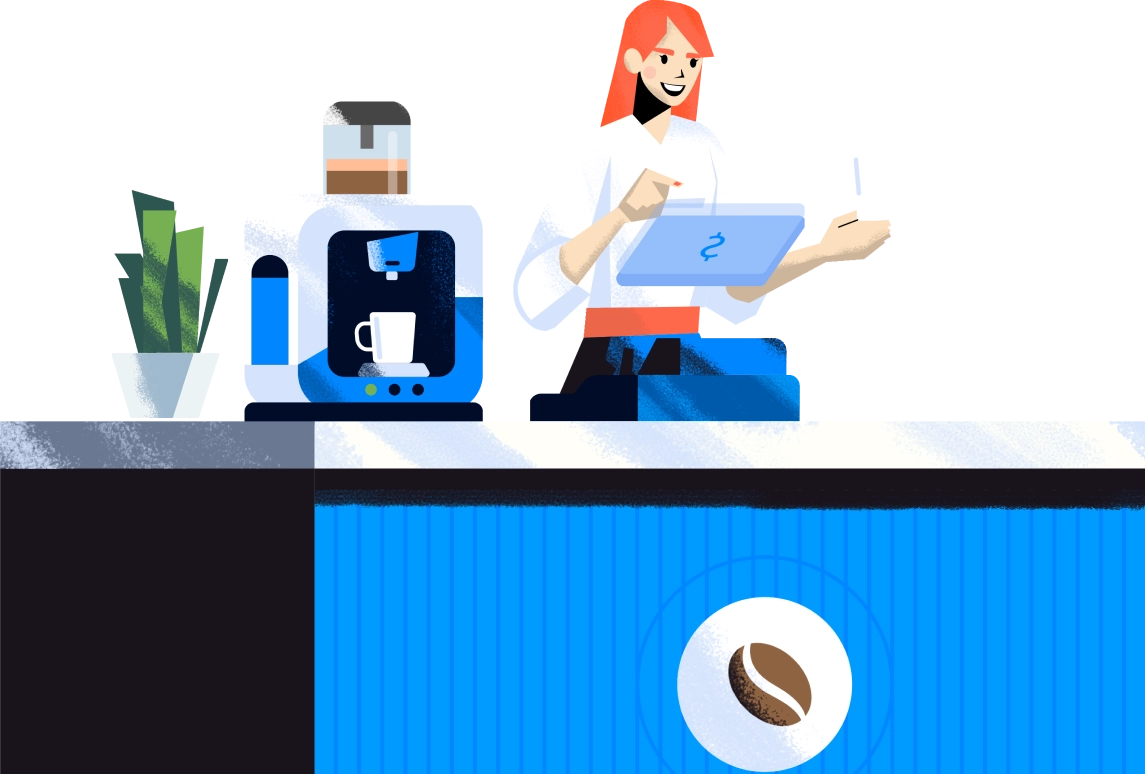Our 10 favorite future-proof helpdesk ticketing system
Here's a selection of 10 helpdesk software that provide a multichannel ticketing system. Based on recent reviews gathered from Reddit, Youtube and experts' knowledge from Antoine Goret, G2 Reviews,
Customer service ticketing software helps support teams centralize, prioritize, and resolve, and track customer issues efficiently. If you're dealing with low customer support satisfaction , bad time to resolution, or overwhelmed inboxes, you're not alone.
The right AI help desk ticketing platform brings structure to chaos by routing conversations, optimizing workflows with artificial intelligence, synchronising with your database, giving your team the context they need to deliver fast and effectivez support.
TLDR section to help you fast
| Software | Key Strengths | Starting Price | Pricing Page |
|---|---|---|---|
| Crisp | AI-native inbox,SMB-friendly, flat pricing, fast setup | Free – $95/mo (10 agents) | Crisp Pricing |
| Zendesk | Enterprise-grade ticketing & automation | $55/agent/mo | Zendesk Pricing |
| Freshdesk | SMB-friendly, affordable AI ticketing | $15/agent/mo | Freshdesk Pricing |
| HubSpot Service Hub | Deep CRM integration, strong reporting | $20/seat/mo | HubSpot Pricing |
| Intercom | AI-first, proactive engagement | $39/seat/mo+ | Intercom Pricing |
| HelpDesk | Simple ticketing, easy to adopt | $29/agent/mo | HelpDesk Pricing |
| Help Scout | Email-first, human-centric | $20/agent/mo | Help Scout Pricing |
| Front | Email + collaboration in one inbox | $19/seat/mo | Front Pricing |
| Zoho Desk | Best for Zoho users, affordable | $14/agent/mo | Zoho Desk Pricing |
Crisp
Crisp is an AI-native helpdesk support platform designed for modern companies. It unifies live chat, email, WhatsApp, and other channels with a ticketing system, knowledge base, and AI-powered automations in one shared inbox.
Crisp is especially popular with SaaS and small-to-mid-sized businesses thanks to its clean design and transparent pricing.
Recently cited among the top 50 AI Apps for companies around the world as per a16z.
Key features
- Shared inbox for chat, email, calls, socials, and more
- AI-powered writings tools & AI chatbots
- Knowledge base and self-service tools
- Analytics on team performance
- Integrations with 2,000+ tools (Jira, Trello, HubSpot, Stripe, Shopify, etc.)
Pros & Cons
- Simple, intuitive design
- Affordable flat pricing (not per agent until 20+ seats)
- Strong AI features without heavy setup
- Great for growing teams (0–50 employees)
- Less enterprise customization than Zendesk or Salesforce
- Marketing features are more limited than dedicated tools
Pricing
- Free plan for small projects
- Essentials: €95/month, includes 10 agents
- Plus: €295/month, includes 20 agents
Zendesk
Zendesk is one of the largest players in the customer service industry, serving enterprises worldwide.
Known for its robustness and integrations, it offers advanced ticketing, automation, and reporting for large companies around the world.
Often seen as a mastodont, Zendesk can be hard to customize without experienced-help.
Key features
- Omnichannel support: email, chat, voice, social
- Advanced ticketing with SLAs, macros, and routing
- Rich analytics and dashboards
- Marketplace with 1,200+ integrations
- AI-powered bots and intent detection
Pros & Cons
- Highly customizable workflows
- Strong enterprise features and integrations
- Extensive partner ecosystem
- Expensive for small teams
- Can feel complex and “heavy” to set up
- Paywalls on many advanced features
Pricing
- Starts at $55/agent/month (Suite Team)
- Advanced plans can exceed $150/agent/month
Freshdesk
Freshdesk by Freshworks targets SMBs with a user-friendly ticketing system that scales up with automation and AI.
Especially good for ITSM, the indian company helps companies around the world to provide better customer support.
Often cited as a good product, some people tend to say the UI is dated and software slow at some point.
Key features
- Ticketing system with SLAs and escalation
- Omnichannel support: email, chat, phone, social
- Freddy AI for self-service and suggestions
- Marketplace of 1,000+ apps
- Collaboration features
Pros & Cons
- Affordable entry-level pricing
- Intuitive interface
- Flexible deployment for SMBs
- Advanced features require higher-tier plans
- Can lack depth for complex enterprise use
Pricing
- Free plan available
- Paid plans start at $15/agent/month
- Enterprise plans around $95/agent/month
Hubspot Service Hub
HubSpot Service Hub extends the HubSpot CRM ecosystem into customer support.
It’s ideal for businesses already using HubSpot for sales and marketing. However, some customers are expressing concerns about the price impact it has when enabling this suite of tools.
Once good strategy might be to combine free Hubspot CRM with software with a good integration, such as Crisp, FreshDesk or HelpScout for example.
Key features
- Shared inbox connected to HubSpot CRM
- Knowledge base and customer portal
- Automation via workflows
- AI-powered insights and reporting
- Deep CRM integration for customer history
Pros & Cons
- Native integration with HubSpot Sales & Marketing
- Strong reporting and analytics
- Great all-in-one option for HubSpot users
- Adds up to your existing HubSpot bill
- Limited without broader HubSpot suite
Pricing
- Starts at $20/seat/month (Starter)
- Professional: $500/month for 5 users
- Enterprise: $1,200/month for 10 users
Intercom Suite
Intercom positions itself as an AI-first customer service platform.
It focuses on proactive engagement, automation, and advanced workflows, often favored by startups and enterprises with complex support needs.
Especially good with chat conversations, the recent focus of Intercom moves towards building AI Agent for customer service but for now, we will analyze Intercom Suite, which offers a helpdesk solution (not the case for Fin, the AI Agent).
Key features
- AI-powered chatbot and helpdesk
- Proactive messaging (in-app & email)
- Workflow builder for automation
- Deep reporting and analytics
- App store with 350+ integrations
Pros & Cons
- Strong AI and automation
- Sleek, modern UI
- Great for proactive engagement
- Expensive compared to alternatives
- Overwhelming for smaller teams
- Add-ons can quickly raise costs
Pricing
- No free plan
- Plans start at $39/seat/month, but most customers spend much more
- Advanced plans often exceed $150/seat/month
Visit Intercom Suite Pricing Page ->
HelpDesk
HelpDesk, developed by the LiveChat team, is a lightweight customer support platform built around ticket management.
It’s designed for teams that want a straightforward way to track, assign, and resolve customer requests without the learning curve of enterprise systems.
By focusing on clarity and ease of use, HelpDesk strips support back to the basics, which some teams love, but others may find limiting when they realize advanced automation and AI aren’t really part of the package.
Key features
- Ticket management with tags and statuses
- Shared inbox
- Automation and canned responses
- Integrates with LiveChat ecosystem
- Reporting and analytics
Pros & Cons
- Easy to set up
- Affordable entry point
- Lacks depth compared to Crisp, Zendesk or Intercom
- Limited AI functionality
Pricing
- Starts at $29/agent/month
Visit Helpdesk Pricing Page ->
HelpScout
HelpScout is known for its email-first, human-centric approach to customer support. It’s popular with small businesses, nonprofits, and startups that value a personal, conversation-driven experience over rigid ticket numbers.
The trade-off? That same simplicity makes it charming for small teams but frustrating once you start scaling : advanced automation, deep analytics, and AI support are simply not what Help Scout is built for.
Key features
- Shared inbox with collaboration tools
- knowledge base
- Beacon for chat and self-service
- Reporting and customer profiles
- Light automation
Pros & Cons
- Human-centric, simple interface
- Transparent pricing
- Great for small teams and nonprofits
- Not ideal for enterprises
- Limited automation compared to Intercom, Crisp or Zendesk
Pricing
- $20/agent/month (Standard)
- $40/agent/month (Plus)
- $65/agent/month (Pro)
Visit HelpScout Pricing page ->
Front
Front combines email, chat, and collaboration into one shared inbox designed for productivity. It blends email client familiarity with ticketing capabilities.
The platform can be seen, as for Crisp, as the young guns of customer support platforms, providing a modern, efficient, yet easy to setup, solution for companies around the world.
Key features
- Shared inbox for email, chat and socials
- Collaboration with comments and assignments
- Automation and rules
- Analytics on team performance
- Integrations with CRM and project tools
Pros & Cons
- Feels like email, easy adoption
- Great collaboration features
- Strong analytics
- Less advanced AI compared to Crisp or Intercom
- Focused mainly on email-heavy teams
Pricing
- Starts at $35/seat/month
- Advanced plans up to $99/seat/month
ZohoDesk
Zoho Desk is part of the Zoho ecosystem, making it a natural fit for businesses already relying on Zoho’s CRM, finance, or marketing tools.
It combines affordable ticketing with surprisingly powerful reporting, making it attractive to companies that want depth without paying enterprise prices.
But the catch is well-known: Zoho Desk can feel clunky, dated, and frustrating to set up, proof that while it remains a major player in the industry, popularity doesn’t always equal polish.
Key features
- Ticketing with SLAs and multi-department setup
- Omnichannel support (chat, email, phone, social)
- AI assistant “Zia” for suggestions
- Custom dashboards and analytics
- Tight integration with Zoho CRM and apps
Pros & Cons
- Affordable pricing
- Deep integration with Zoho ecosystem
- Good for multi-department organizations
- Interface less modern than competitors
- Best suited for existing Zoho users
Pricing
- Free plan available
- Paid plans start at $14/agent/month
- Enterprise plans at $40/agent/month
Visit Zoho Desk Pricing page ->
To provide you with in-details comparison between each of the solution listed above, you can see how they all compare and choose the best helpdesk software for your company.
Compare the best helpdesk systems
Quick filtered comparison to help you choose the solution that fits the most with your requirements :
- Best for modernizing businesses : Crisp, Intercom & Front
- Best for startups and SMBs: Crisp, Help Scout
- Best for AI Automations : Intercom, Crisp
- Best for enterprises: Zendesk, Intercom
- Best for existing CRM users: HubSpot Service Hub, Zoho Desk
- Best for email-heavy teams: Front
- Best for budget-conscious teams: Freshdesk, HelpDesk, Crisp
Key features of helpdesk ticketing tools
Before buying your next helpdesk ticketing tool, you got to make sure it covers all your needs.
Below is a quick list of features we deem essential when looking for a modern, efficient and powerful customer support platform for your business in 2026.
- Automated ticket routing: Directs inquiries to the right team members or departments ensuring quick and efficient responses.
- Omnichannel support: Allows your team to centralize inbound message from multiple channels like email, chat, and social media or messaging apps in one place.
- Self-service portals: Provides customers with access to FAQs and help articles, reducing the workload on your team.
- AI Agents: Handles routine inquiries, automate tasks and improves time to resolution, freeing up your team for more complex issues.
- Customizable workflows: Lets you craft internal processes to fit your business needs, enhancing productivity and efficiency.
- Sentiment analysis: Gauges customer emotions to help prioritize urgent tickets and improve satisfaction.
- Mobile access: Enables your team to manage tickets and support customers from your mobile phone.
- Advanced analytics: Offers insights into performance metrics, helping your team make data-driven decisions.
- Multi-brand support: Allows you to manage multiple brands or divisions from a single account, centralizing operations.
- Integration capabilities: Connects with existing tools like CRM systems and marketing platforms, ensuring a seamless workflow.
Below is a scorecard for each vendor built upon features described above
| Vendor | Automated Ticket Routing | Omnichannel Support | Self-Service Portals | AI Agents | Customizable Workflows | Sentiment Analysis | Mobile Access | Advanced Analytics | Multi-Brand Support | Integration Capabilities |
|---|---|---|---|---|---|---|---|---|---|---|
| Crisp | 8 | 9 | 8 | 9 | 8 | 7 | 9 | 7 | 6 | 8 |
| Zendesk | 10 | 10 | 9 | 8 | 10 | 9 | 9 | 10 | 9 | 10 |
| Freshdesk | 9 | 9 | 8 | 8 | 8 | 7 | 9 | 8 | 8 | 9 |
| HubSpot Service Hub | 8 | 8 | 8 | 7 | 9 | 7 | 8 | 9 | 7 | 9 |
| Intercom | 9 | 9 | 8 | 10 | 9 | 8 | 9 | 9 | 7 | 9 |
| HelpDesk | 7 | 7 | 7 | 6 | 6 | 5 | 8 | 6 | 5 | 7 |
| Help Scout | 7 | 8 | 8 | 6 | 6 | 6 | 9 | 7 | 5 | 7 |
| Front | 8 | 7 | 6 | 6 | 8 | 6 | 9 | 7 | 5 | 8 |
| Zoho Desk | 9 | 9 | 8 | 8 | 9 | 7 | 8 | 9 | 8 | 9 |

Benefits of help desk ticketing software for businesses
Still doubting about the benefits of implementing ticketing tool for your teams and customers? Here is a list of benefits you can find that can help you introduce the subject in your company and showcase the value.
- Improved response times: Automated ticket routing ensures inquiries reach the right team member quickly, reducing wait times for customers.
- Enhanced customer satisfaction: Omnichannel support and self-service portals provide customers with convenient options for getting help, boosting their overall experience.
- Increased productivity: Customizable workflows and AI-powered chatbots handle routine tasks, allowing your team to focus on more important issues.
- Better data-drive strategies: Advanced analytics offer insights into support performance metrics, helping your company make informed decisions to improve service and product.
- Consistent service delivery: Multi-brand support and integration capabilities ensure your team can manage multiple brands efficiently without missing a beat.
- Cost savings: Self-service portals and AI chatbots reduce the need for additional staff, lowering operational costs while improving teams' productivity.
- Scalability: The software's ability to handle increased ticket volumes supports your business as it grows, ensuring continued efficiency.
Tricks to improve implementation of a help desk
0. Import your previous conversations to empower AI answers
Until recently, most companies used to let previous conversations sleep in their last CS platform. But it shouldn't be the case anymore. In the era of AI-augmented customer support, data is gold. And conversations are true gems.
1. Start with one channel, then expand
Don’t overwhelm your team on day one. Begin by connecting the main support channel (usually email), then add chat, phone, or WhatsApp once the basics run smoothly.
2. Import existing knowledge
Move FAQs, help center, common answers, and past message templates into your new help desk. This gives your team a ready-made library and speeds up responses from day one.
3. Define inbox rules and workflows
Before going live, set rules for ticket routing, escalation, and ownership. Everyone should know what they handle and when to reassign the conversation.
4. Measure early, adjust quickly
Build your very own custom dashboard, track key metrics (first response time, conversations' backlog, CSAT) within the first weeks. Make small adjustments early to prevent bigger issues later.
5. Enrol an app partner to scale fast
Most of the platform now offer a large set of implementation partners that can helpo with moving from your previous platform or implement your new solution faster.
Choosing the right helpdesk software in 2025 is less about ticking feature boxes and more about finding a platform that matches your team’s stage, goals and mindset.
Small businesses modernizing from Outlook or Gmail may value simplicity and affordability with tools like Crisp or Help Scout. Enterprises with complex workflows might lean toward feature-rich ecosystems such as Zendesk or Intercom. And if your company already runs on HubSpot or Zoho, their native service hubs can be a natural fit.
The common goal? Every business benefits from a central place where conversations, knowledge, and AI-powered assistance come together.
The sooner your team makes the move, the faster you’ll improve response times, customer satisfaction, and long-term loyalty.
👉 Start simple, grow with your needs, and pick a platform that makes customer support not just a cost center, but a driver of revenue growth.













